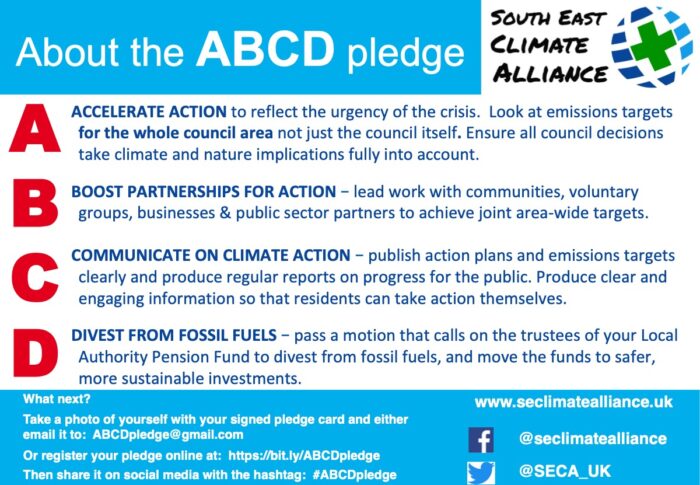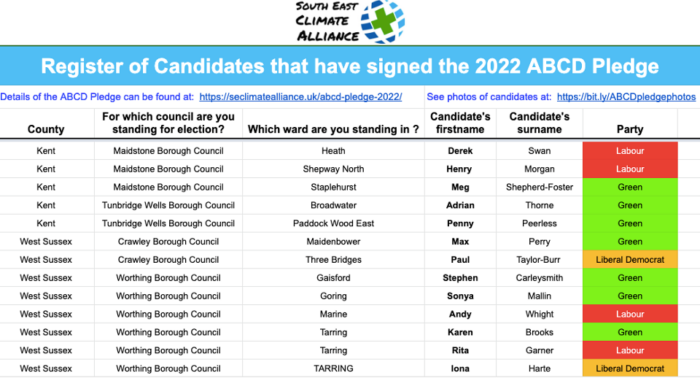Local elections are coming up again on May 5th. They are being held in 23 borough and district councils across the South East. With all the clamour of global and Westminster politics, it is more important than ever to keep local climate action in the spotlight.
That is why SECA is running our ABCD Climate Action Pledge campaign again this year, with updated pledge cards and added urgency! SECA member groups in the affected districts are getting behind the campaign and will be encouraging their local candidates to sign up. In this blog, Sally Barnard, explains how the campaign works and why it matters.

THE PLEDGE
By signing the pledge candidates are agreeing, if elected, to press their council to: Accelerate action, Boost partnerships, Communicate, and Divest from fossil fuels. The reverse side of the Pledge Card spells it out in more detail:

Reverse side
HOW CANDIDATES CAN SIGN UP
There’s four steps involved:
1. Download the pledge card, print it out, and fill in the details.
2. Take a photo of the candidate holding up the pledge card.
3. Register the pledge with SECA so we can keep track of who’s signed (see below).
4. Post the photo on your facebook/social media with the hashtag #ABCDpledge
Candidates can do all this themselves, or campaigners can work with them to take the photo and record the pledge.
REGISTERING THE PLEDGE
There’s two ways to do this:
EITHER – enter the details and upload the photo directly onto our online Pledge Register: (note: this is a Google Form so you’ll need a Google account to do this)
OR – email the photo to SECA, together with the candidate’s name, the election they are standing in, the political party and the name of the electoral ward. Here’s the address: ABCDPledge@gmail.com
WHO’S SIGNED SO FAR
More than 100 candidates have already signed the Pledge. You can see a live update on who has signed so far here: https://bit.ly/ABCDsignatories2022
And you can see a gallery of photographs of candidates holding up their pledges here: https://bit.ly/ABCDpledgephotos
 Some of this year’s early pledgers
Some of this year’s early pledgers
BACKGROUND TO THE PLEDGE
Why these elections matter
The local elections on May 5th are a key moment in the democratic process. This year Westminster politics and the terrible war in Ukraine are likely to be at the front of people’s minds. But the danger of the climate crisis has not gone away and we have been shown the fragility of our supplies of fossil fuels. It would be easy for climate change to fall off the agenda, at a time when it is crucial to keep up the momentum and pressure for action in our local areas.
Where elections are being held
These are the councils where seats are being contested:
Unitary authorities: Isle of Wight, Portsmouth, Southampton
District and Borough councils: Adur, Basingstoke, Crawley, Eastleigh, Elmbridge, Fareham, Gosport, Hart, Hastings, Havant, Maidstone, Mole Valley, Reigate, Runnymede, Rushmoor, Tandridge, Tunbridge Wells, Winchester, Woking, Worthing.
Note there are no county council elections this year.
Coordinating our efforts
We are suggesting that member groups in these council areas contact all the candidates for their local area ahead of the election to invite them to sign the pledge (see template letter below).
ABCD Pledge Card
The SECA Pledge Card can be downloaded as a pdf file or a PowerPoint file ( so that campaign groups can make local adjustments)
The front of the card is for candidates to sign; the reverse side spells out the pledges in a bit more detail.
The pledges focus on four areas where further action by most councils is urgently needed. Here’s the thinking behind them:
A. Accelerate Action – we want all councils to accelerate their action to reflect the urgency of the crisis. Increasingly councils are committing to a leadership role and setting emissions targets for their whole council area, not just the council owned estate. We want this to be the case for all councils. We want councillors to raise questions and keep challenging to ensure that all council decisions take climate and nature fully into account (see note 1 below).
B. Boost Partnerships – councils are realising that they need to build alliances to galvanise climate action, though this has often been slow and patchy. Alliances with community groups, business, and other local stakeholders need to be boosted. Many communities are organising to take action and need to be supported with grants and helped to find their way through council processes.
C. Communicate – this remains a weak spot for many councils. Only 17 out of 56 councils in the South East mention climate on their home page. We need all councils to reach out to local residents with clear and engaging information so that the public know what the council is doing and are encouraged to take action themselves. Council’s also need to be transparent on what they are actually achieving. So far, only 20 councils in the South East have published an annual climate action progress report (see recent blog).
D. Divest from Fossil Fuels – This is a crucial issue for most climate campaigners. How can councils recognise the climate emergency yet ignore the impact of their multi-million pound pension fund investments in fossil fuel companies? Some people will argue that pension fund management is not within the remit of district and borough councils, as it is delegated to the county level. But it is possible for district and borough councils to pass a motion calling on the Trustees of their Local Authority Pension Fund to divest, as Adur and Worthing Council did in December 2019. So far, none of the county councils in our region have done so.
Some councils are further ahead than others on the four pledge areas. You can check what climate targets your council has already agreed to, and see how they are performing on partnerships, communication and divestment, by looking your council up on the SECA Survey. There’s a tab for each county, and details for every local authority in the South East.
Key deadlines
These are the key deadlines:
Approx April 6th – Official lists of candidates and contact details will be published on your local District or Borough Council website.
April 18th – This is the approximate date that postal votes will be sent out. Voters often post them back straight away, so a significant amount of campaigning needs to happen before this time.
May 5th – Election day
Contacting candidates
Postal addresses of candidates (or their agents) will be available around April 6th on your District/Borough council website. For most candidates you can find their emails by checking the Who Can I Vote For website where you put in your postcode and it tells you who is standing.
Here is the outline of a template letter you can adapt and send if that’s easiest.
Note that it is good practice to contact all political parties. If you are using SECA materials please make sure that you do so, as we take care to be non-party political.
Any questions – just email us at: ABCDpledge@gmail.com
Good luck!
Notes:
1. It is important for all council candidates to be familiar with their own council’s current climate action plans. You can find a list of them here. Nearly all have room for improvement. For an assessment of how your council’s plan stacks up against others across the country, take a look at the recently published scorecard from Climate Emergency UK, which we wrote about in this blog.
Sally Barnard is one of the coordinators for council issues at the South East Climate Alliance, and has been closely involved in developing and updating the SECA Survey. You can contact her at: southeastclimatealliance@gmail.com


